Donald MacLean's Blog 16
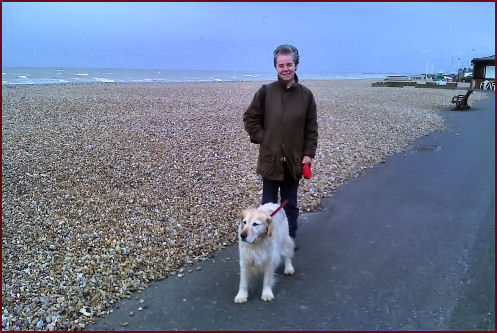 |
We spent a week (Easter) at the South coast.
A couple of pix from my mobile phone:-
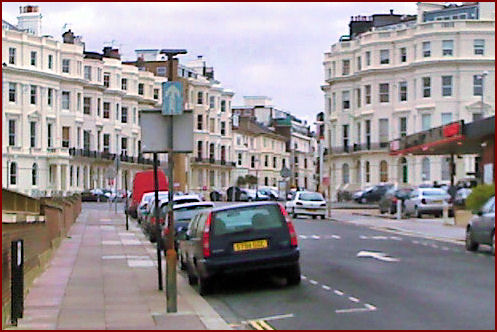 |
Ann &
Beckie, windswept, on the beach
across the road from our one-time second home
(On the right - 2nd floor)
We spent many happy weekends there - especially in windswept winters. Nostalgia.
Looking back is usually what my blogs are about. In my mid-eighties I suppose it's what many of my thoughts are about.
This time,
though, I ask you to share with me events that are unfolding here and now. Day
by day. Events that will almost certainly impact your life - in whatever part of the world
you are.
ADJUSTMENTS
The latest figures show that 95% of music being enjoyed by us ordinary citizens has been downloaded from a fellow-citizen ("file-sharing").
Is this another valuable freedom brought to us by the internet and broadband?
In blog #8, I offered you my opinion that it is not ... and that it matters
... because you and I are not prepared for the inevitable consequence - a
world in which the only Intellectual Property (music, movies, books etc) will
be created by unpaid amateurs.
Technology has replaced the 'gramophone record' with CDs (which still come to us, typically, via warehouses and shops). And technology is now replacing CDs with downloaded MP3's. So we save the cost of distribution. Tough if you work in a record shop, but a boon for us consumers. That is progress - change benefiting the majority.
The problem is that file-sharing eliminates also the creator of the product itself! It breaks the 'Copyright Cycle' which feeds back to a successful creator the means to create another successful product. (It returns less - sometimes nothing - to the less successful creator ... it's an efficient system.)
Technology - continually developing - now enables us to download moving pictures as well as sound. Video & TV & Movies are now being 'file-shared'. If this broken Copyright Cycle isn't repaired then the scale on which this is happening will increase (as broadband develops) - eliminating audio-visual creators just as it is already eliminating 'audio' ones.
Maybe that will finally introduce the cold air of reality into the situation. Some good music can be created by amateurs in their bedrooms ... but good movies cannot.
Why does the civilised world find itself in this blind-alley?
The worldwide music industry must accept much of the blame.
I cannot have been the only voice warning, 35 years ago,
that technology would short-circuit the traditional supply-chains -
first with music then, inevitably, with audio-visual products.
That's history. How might we now
back out of this cul-de-sac?
It won't be easy ... when reversing one's vision is less clear.
The UK government produced its
solution last June and now,
as I write, it is being rushed through Parliament
before the election.
Scene 1 on TV. The parents of a teenage boy and girl are uncomfortable.
Interviewer: "When you were at the supermarket your daughter was found to have slipped a CD into her pocket and your son the DVD of a movie - what do you have to say?"
Parents: "We're very embarrassed ... they're good kids - we've brought them up to understand right and wrong - but of course we can't supervise them all the time while we're shopping. Yes, of course we paid the supermarket immediately."
Scene 2 on TV. The parents of a teenage boy and girl are angry.
Interviewer: "Our computer expert has examined the laptops in your childrens' bedrooms and found that they have been downloading, from file-sharing websites, music and movies worth many hundreds of pounds. What do you have to say?"
Parents: "Well, we wouldn't know how to do that - but they're both computer-literate. They tell us that all their friends do it ... and there's no way we can supervise what they do in their own rooms every evening. It's outrageous that we're liable to have our broadband service restricted ... even cut-off, if this continues. It's only music."
I invented scene 1. It would rarely happen - and if it did, the reaction of most parents would, I think, be much as I've described.
But I have just watched Scene 2 on the BBC documentary series "Panorama" which was reflecting public reaction to the UK Government's proposed new laws. (This scene could be happening many times every day, everywhere.)
'"Publishing' will have to make some very difficult adjustments."
These long-overdue adjustments are starting to happen - in many countries - in similar ways.
In similar ways because there's not much choice. Publishers (of books, music, movies etc - any intellectual property) must find new business models ... including downloading as part of a Copyright Cycle ... generating funds that will support their role as the catalysts of new books, music and movies etc. And Internet Service Providers (ISPs) will inevitably have to take responsibility for the illegal use of their pipelines.
These adjustments matter rather a lot in the UK because a high proportion of the country's wealth is generated by creative industries - who depend, like any other craftsmen, on getting some return for their efforts.
ISPs are aggressively resisting taking any responsibility, saying that they merely supply the conduits and cannot be responsible for how they are used.
I recall the BBC resisting, for a while, demands from the Musicians' Union for some payment to every musician each time his/her recorded performance was broadcast. By the time I became a producer of music programmes this had become standard practice - every performer, every item, every transmission of it - were all coordinated in a document called a "PasB" (programme as broadcast) - which put a small sum into the pocket of those who had created the item. The BBC very properly accepted the necessity, the justice, of this extra expense.
Most countries of the Western world have been working-out how to repair the Copyright Cycle - how to update the laws under which you and I receive our information and entertainment - adjusting to the developments about which I've written in several of my blogs. (30 years ago I would have been at the centre of these adjustments.)
The UK government finally assigned this task to a Scot in his early forties, Stephen (now Lord) Carter, a graduate of Aberdeen University and both London and Harvard Business Schools. His proposals are called "Digital Britain". They were published in June and have been working their way through lengthy consultation processes. They have been translated into a "Digital Economy Bill" - which is due to be debated by Parliament this week.
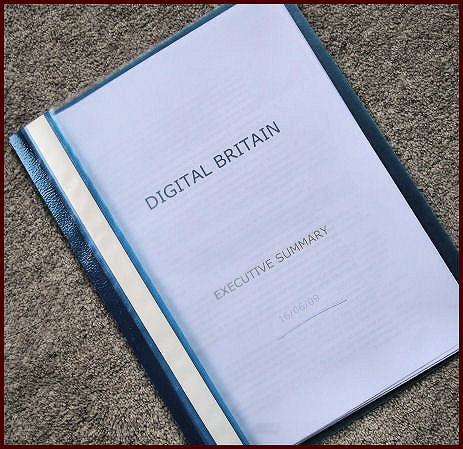 |
The first line of his report sets the scene:
"The communications sector underpins everything we do
- as an economy - as a society".
It says that the UK Parliament should do five things:
1. Introduce protection against illegal online file-sharing.
2. Enable the extension of digital Radio.
3. Enable the extension of high-speed broadband.
4. Enable the production of more public-service television.
5. Extend age-classification to video
games.
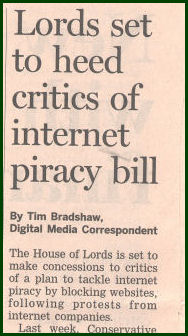 ' ' |
When the Bill was published there was an immediate revolt by the ISPs - which evoked some support from the Upper House.
As I said: 'Publishing' will have to make some very
difficult adjustments."
Item 5 is not difficult. It wasn't easy when I led the team which replaced censorship with age-classification for movies and videos, but that is now accepted as normal.
Item 4 has boiled down to a decision (in these financially-difficult times) about whether or not to 'top-slice' the BBC's income - the annual "TV Licence" which most UK households have to pay to fund the BBC. A decision for the next government. (The 'Beeb' will, of course resist, but I suspect that the average household will not care much either way.)
Item 3 (improving broadband connections): Lord Carter suggested that every household with a phone-line should have a small sum added to its monthly charge to enable British Telecom to extend its wired broadband network to rural (uneconomic) areas. A sensible idea ... but the popular press will make a meal of it and I bet the politicians will take their cue from that.
Item 2 (digital radio) looks dicey to me. Ann has (and uses daily) a DAB radio in the kitchen - it seems to me no better than the hi-fi in our lounge (VHF and Internet Radio) or the tiny VHF receiver which feeds my ear-buds (during sleepless nights) with the excellent BBC World Service. I doubt the members of Parliament will understand (or care much about) this item.
So, as I anticipated, attention is entirely focused on item 1. So much so that the whole thing is now universally called "The Internet Piracy Bill".
27th March 2010. The Digital Economy Bill is being debated in Parliament today. As midnight approaches I'm watching the debate on BBC TV's "Parliament" channel. Our MPs are well-informed - the lobbyists (on both sides of the argument) have been doing their thing!
I judge that the ISP's case ("it's no part of our business to control the use of our conduits") is being put more forcefully than the case for their having to apply legal judgments. Safeguards against the innocent suffering are being strengthened (suspect households will receive two formal court warnings, triggering a two-stage reduction of broadband service).
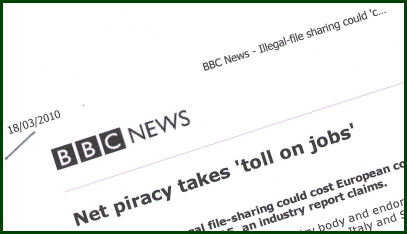 |
|
'FILE SHARING IS BAD' |
Britain is not alone in facing up to this problem. The increasing tide of disagreement is spreading - you will have seen evidence of it in television and newspaper reports worldwide.
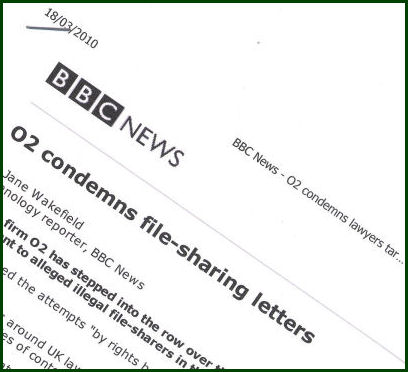 |
|
'THIS REMEDY IS BAD' |
Every MP is angry that this contentious bill is being rushed through Parliament as it closes down for the election. (They call this the "Wash-up" period.)
It's emerging that the Government has watered-down several of the proposals in order to get enough votes for the Bill to pass today.
Only one of Lord Carter's proposals looks certain to survive intact: Nr 5 - the extension to video-games of the age-classification system.
Item 3, as I suspected, is a casualty. Lord C's small monthly tax on our phone bill (to enable broadband to be extended to rural areas) is scrapped. All parties are committed to achieve that social benefit so perhaps they'll divert a piece of the BBC's income to do this (instead of increasing public-service TV).
("Parliament" is the collective name for a group of .... owls.)
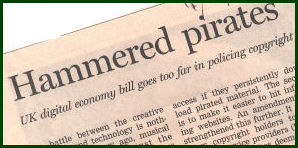 |
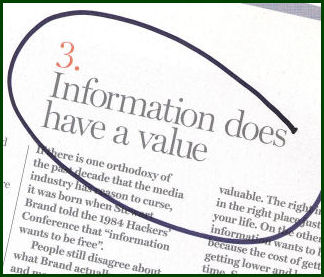 |
My newspaper is one of the few which also has an excellent online version - and charges for both. One day this week its 'leader' column tended to one side of the argument ... while an article in its enclosed magazine put the opposite case.
And just as the Internet Service Providers (ISPs) looked like succeeding in their revolt against the Government's proposal (that they cease 'aiding and abetting' file-sharing) the influential Consumers Association (who publish "Which?") swung the argument back again with an amendment (to the Digital Economy Bill) which would prevent copyright holders from approaching culprits directly ("Bully-Boy tactics") and depend solely on the ISPs policing their customers!

|
Meantime:
Advertisers are moving from Newspapers to Google ...
and Google
is connecting us with the newspapers' reports online ...
so the income of papers is doubly reduced.
Book publishers (structured to distribute their products
mainly ... yes ... via warehouses and shops)
find increasing numbers of us prefer to download a
digital version to our Kindles and iPads.
Are they learning from the misjudgement of the music companies?
Many movies and expensive TV productions are now available free on the internet.
The 'copyright cycle' is an efficient system - and it's broken.
There's a growing assumption that because the cost of distribution has been eliminated
by the internet, all intellectual property is - and should be - free!
It's a myth.
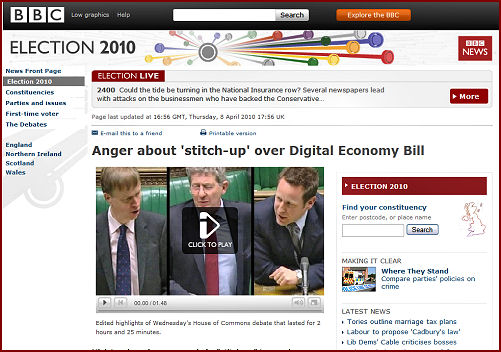 |
Midnight: The "Digital Britain" Bill has been passed. Much amended:
A copyright-owner will have to write to someone who is distributing his product for free and warn them to desist. If they fail to do so he must write to them again giving final notice. If they persist then a court order can be sought which requires the ISP to restrict the offender's broadband service. And if that also fails then his internet access can be terminated by court order.
Having forecast this problem, and having spent
so much time working for solutions,
you will not be surprised that I care
deeply about the situation we're now in.
I'm no longer alone in expecting that we shall receive almost all our 'intellectual property' through the internet - quite soon now ... including TV, music and many books. The first industry that needed to adjust to a digital world was music. The big record companies could have pioneered legitimate downloading. They would have lost their 'downstream' role but would have preserved their 'upstream' one, nurturing and promoting talent - creating a new "Copyright Cycle" in which a smaller charge was paid by a larger audience.
Instead they clung to their traditional business model - as a whole generation grew up believing music can be free.
And this has encouraged the assumption that intellectual property
of all sorts (now costing nothing to distribute) can all be free.
Unless we're content with amateur work, it cannot.
In the UK the buck now passes from Stephen Timms (ex "Minister for Digital Britain"),
presumably to Jeremy Hunt the incoming "Minister for Culture,
Media, Olympics and Sport".
He created one of the UK's most successful specialist publishers and websites.
I wish him well.
"The deeper a disagreement, the harder it is
for both sides to agree
what it is about!"
(Anon)
- - - - - -
Back to 'Contents' table
On to
Blog 17
- - - - - -